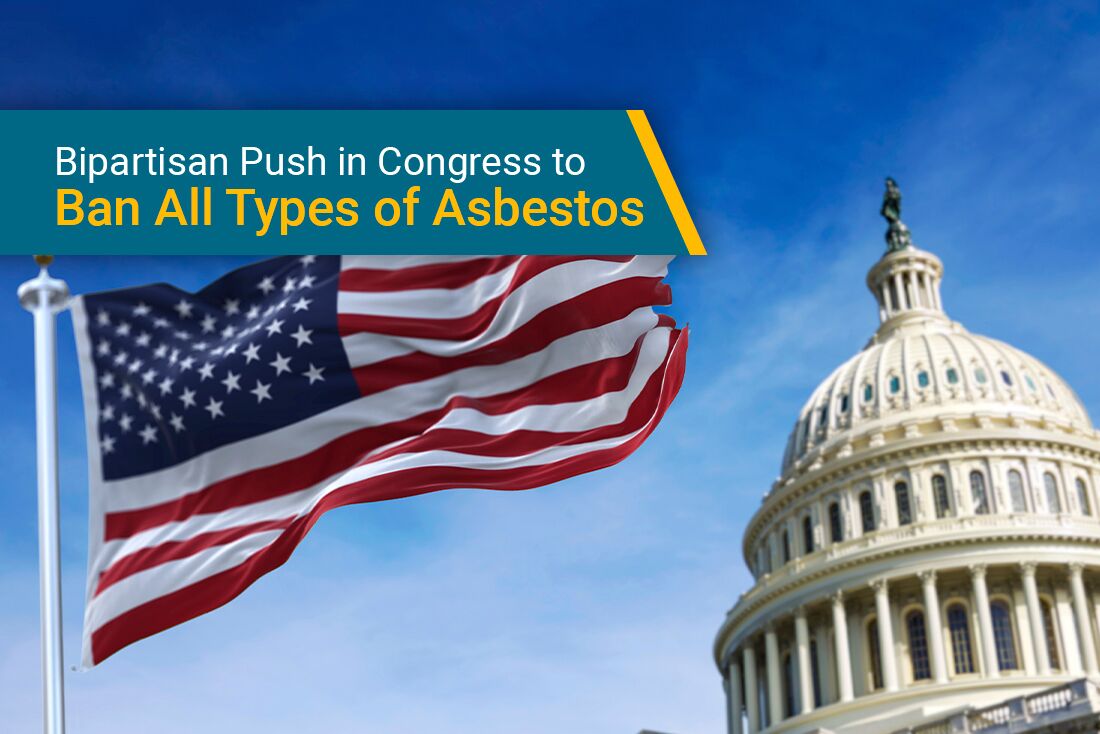Estimated Read Time: 3 minutes
The U.S. Environmental Protection Agency (EPA) banned chrysotile asbestos in 2024. This is the most common type of asbestos, and the ruling was a significant step toward stopping any resurgence of asbestos in the United States.
Now, legislators in the U.S. Congress are going a step further: attempting to ban all types of asbestos by reintroducing a previously dormant bill.
U.S. Senator Jeff Merkley (D-OR) and U.S. House of Representatives Suzanne Bonamici (D-OR) and Don Bacon (R-NE) reintroduced the Alan Reinstein Ban Asbestos Now Act of 2025, which would prohibit the manufacture, processing, use and distribution of all six types of asbestos.
The reintroduction of this bill comes during National Mesothelioma Awareness Month in September. Asbestos is a dangerous mineral and the only known cause of mesothelioma, which is a rare type of cancer affecting thousands of Americans each year. Banning asbestos has been a discussion for decades.
What Is Asbestos?
Asbestos is a natural mineral popularized during the 20th century in several industries and professions. The durability of asbestos, along with the affordability to mine and manufacture it, led to using the mineral in the construction of buildings. Homes, offices, schools, hospitals and more built during the 20th century were layered with asbestos to keep parts sturdy and protect from heat.
During the 1970s and 1980s, scientists presented facts connecting asbestos to cancer. Workers exposed to asbestos on job sites were more likely to develop certain types of cancer, including mesothelioma and lung cancer. The family members of these workers were also at risk of exposure and developing cancer.
During the 1980s, industries began moving to alternatives. People affected by cancer started suing companies that manufactured, sold, and promoted asbestos.
History of the Alan Reinstein Ban Asbestos Now Act
The Alan Reinstein Ban Asbestos Now Act has had many yearly iterations. It first made headway in 2019 – as the Alan Reinstein Ban Asbestos Now Act of 2019 – and was renamed for 2020 after delays.
In November 2019, the House Energy and Commerce Committee voted 47-1 in favor of sending the bill to the House floor. In September 2020, the bill reached the agenda of a U.S. House of Representatives meeting. Unfortunately, the bill was pulled from the agenda moments before the meeting started. There were numerous explanations as to the derailing of the bill, but the conclusion was differences between the parties in some language in the proposed law.
The bill is named after Alan Reinstein, the late husband of Linda Reinstein, who is the co-founder, president and CEO of the Asbestos Disease Awareness Organization. Alan died of mesothelioma in 2006 after 3 years fighting the cancer.
Linda is a public activist who advocates for banning asbestos. She helped draft the Alan Reinstein Ban Asbestos Now Act and has pushed for Congress to pass the legislation.
EPA Ban in 2024
In 2024, the EPA banned mining, manufacturing, selling, and promoting chrysotile asbestos, which is the most popular of the six types of asbestos. The ruling does not outlaw the other five types: crocidolite, amosite, tremolite, actinolite, and anthophyllite.
Activists applauded the EPA’s decision but expressed concern that five types remained legal, albeit highly regulated. Currently, any company wishing to use any of the five legal types of asbestos must apply through the EPA and receive approval.
The legal ramifications for using asbestos – the potential to give a worker or someone else cancer and be sued later – has curtailed many companies from using the mineral. However, the door remains open.
The Alan Reinstein Ban Asbestos Now Act of 2025 would close that door.
The bill is supported by the Asbestos Disease Awareness Organization, International Association of Fire Fighters, Collegium Ramazzini, Environmental Information Association, American Public Health Association, Center for Environmental Health, and Environmental Working Group.
The legislation is also cosponsored by U.S. Senators Richard Blumenthal (D-CT), Alex Padilla (D-CA) and Adam Schiff (D-CA).
The bill likely must go to committee for discussion and approval before reaching the floor of either the U.S. Senate or U.S. House of Representatives for debate and vote. The reintroduction is still a headline-making heartbeat for a piece of legislature to ban asbestos once and for all.
Sources & Author
- Merkley, Bonamici, Bacon Partner on Bipartisan Legislation to Ban Toxic Asbestos, Save Lives. Jeff Merkley Senator for Oregon. Retrieved from: https://www.merkley.senate.gov/merkley-bonamici-bacon-partner-on-bipartisan-legislation-to-ban-toxic-asbestos-save-lives/. Accessed: 09/18/2025.
About the Writer, Devin Golden
Devin Golden is the senior content writer for Mesothelioma Guide. He produces mesothelioma-related content on various mediums, including the Mesothelioma Guide website and social media channels. Devin's objective is to translate complex information regarding mesothelioma into informative, easily absorbable content to help patients and their loved ones.
Sources & Author
About the Writer, Devin Golden
Devin Golden is a content writer for Mesothelioma Guide. He produces mesothelioma-related content on various mediums, including the Mesothelioma Guide website and social media channels. Devin's objective is to translate complex information regarding mesothelioma into informative, easily absorbable content to help patients and their loved ones.
